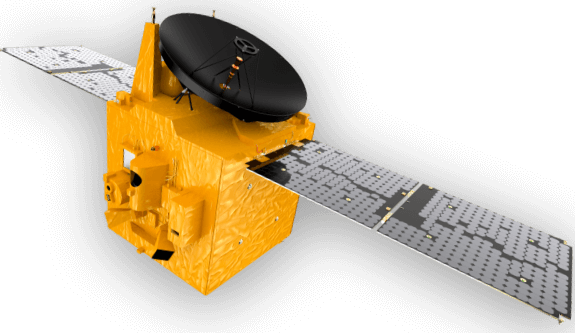Highlights
The UAE is a new entrant in the outer space arena and is currently in the capacity-building phase to more successfully indigenize space technologies.
UAE space policy and law puts a strong emphasis on the safety and sustainability of the space domain.
The UAE’s Mars 2117 initiative demonstrates that the UAE has a long-term vision for space exploration that will inform its strategy of technology development.
SPARC Brief
United Arab Emirates

The Hope Probe. Photo credit: UAE Space Agency.
August 2020
Overview
As a small Gulf state, with a population of nearly 10 million, the United Arab Emirates is a relatively new entrant in the space arena. It launched its first satellite, Thuraya-1, in 2000, and has aggressively sought the development of an indigenous space capacity ever since. The country founded its space agency in 2014, flew an astronaut to the ISS in 2019, and currently has 10 satellites in orbit. These satellites include both telecommunications and remote sensing capabilities. Further, the UAE has planned an ambitious Mars exploration and settlement initiative beginning with a robotic probe, Hope, successfully launched in July 2020.
The ambitious Emirati space program is linked to civil, commercial, and military goals as a regional power in the Middle East. Specifically, the space ambitions of the UAE include the establishment of an active Space Agency focused on research as a way to build indigenous capacity that can then be used to attract commercial actors and bolster its military capabilities.
Industrial Base
The UAE is quite new to space utilization and exploration, and its capabilities are still under development. The current phase could be characterized as ‘capacity building,’ meaning that currently UAE is investing in developing and establishing indigenous capacity in space technologies. The underlying goal in this phase is two-fold. First is having a skilled workforce to attract innovative companies into the country; second is developing a skilled workforce that can fuel innovation from within. Both of these can help to build a vibrant space economy.
The current phase could be characterized as ‘capacity building,’ meaning that currently UAE is investing in developing and establishing indigenous capacity in space technologies.
To date the biggest player in the UAE has been the UAE Space Agency, which is the entity responsible for developing and fostering a local space industry as well as regulating and supervising space activities of the industry. The Space Agency works closely with the Mohammed Bin Rashid Space Centre (MBRSC), a Government of Dubai entity that serves as an incubation chamber for building local capacity in space technology. MBRSC leads the technological development of the UAE satellite program. Despite its newness to the space domain, the UAE has already launched a number of satellites into space. Notable among these is the 2017 Khalifasat, which is a remote sensing satellite built entirely by a team of UAE nationals, marking a milestone in local capacity. If the UAE is successful in its planned planetary exploration missions, it will likely continue to mark milestones that signify its advancement as a space power and further indicate the level of local capacity building that has been achieved.
The major industry player is Yahsat, a satellite telecommunications company based in Abu Dhabi. Yahsat offers a variety of satellite communications solutions across the Middle East region. The Yahsat fleet consists of three geosynchronous satellites with capacity across a range of frequencies, and these satellites carry military, civil, and commercial communications. Yahsat has also acquired Thuraya, a mobile satellite communications subsidiary started in the UAE in 1997. Thuraya maintains a fleet of two satellites that provides quasi-global coverage.
In 2016, the UAE announced the establishment of a space research centre affiliated with the UAE University at Al Ain called National Space Science Technology Centre (NSSTC). The NSSTC is responsible for the construction and operation of a Hyperspectral Earth Observation Satellite.
Law & Policy
The UAE ratified the 1967 Outer Space Treaty, the 1972 Liability Convention, the 1975 Registration Convention by a presidential decree in 2000, and the 1968 Rescue Agreement in May 2017.
Spearheading its space ambitions, the UAE has become the first country in the region that has enacted a comprehensive national law on space activities. According to this law, the UAE Space Agency is responsible for the overall conduct of space activities, including the issuance of licenses for various types of space activities. The Agency is also the competent body to ensure the safety of such activities.
Spearheading its space ambitions, the UAE has become the first country in the region that has enacted a comprehensive national law on space activities.
In September 2016, the UAE National Space Policy was adopted by the Council of Ministers. The most important objective of the policy is to develop the UAE’s space sector including national space legislation. It is in this context that an extensive Space Sector National Law was enacted on December 19, 2019. The new legislation, based on the UAE’s National Space Policy, is coordinated with existing UAE law and incorporates best practices found in already existing national space laws from around the world. The policy goal underpinning the law is to create a legal framework that supports the UAE’s ambitions of becoming a leading player in the global space sector.
The Space Sector Law (Federal Law No. 12 of 2019 on the Regulation of the Space Sector) was designed to meet certain purposes. In addition to the implementation of obligations prescribed by the United Nations treaties, the Law’s other objectives include the establishment of a system for regulating space activities carried out either from UAE territory or by UAE nationals outside UAE. The Law was enacted with the goal of attracting and encouraging foreign companies to establish space activities in UAE. To this end, the law aims to create an appropriate legal and regulatory framework, which will regulate the space sector and achieve the national policy objectives in the UAE. These include the following:
- Enhance and promote investment and encourage the participation of the private and academic sectors in the Space sector and related activities.
- Support the implementation of safety, security and environmental protection measures to promote the long-term stability and sustainability of Space activities and related Space activities.
- Support the principle of transparency and the obligation of the State to implement the provisions of international conventions and treaties relating to Outer space to which the State is a party.
The Space Sector Law creates a comprehensive licensing regime accompanied by a set of rules that provide clarity on the operators’ legal rights and obligations. As part of this licensing regime, the Law implements supervision of authorized space activities through compliance obligations placed on operators. For such purposes, the Law requires the compliance of the operator with the terms and conditions of the space license. Additionally, the Law establishes a comprehensive liability regime to regulate UAE space activities, and stipulates that each operator shall take the necessary measures and plans to mitigate and reduce the impact of space debris. The liability regime is complemented by a flexible insurance requirement.
The law also seeks to facilitate innovation, and addresses aspects of newer areas of space technology such as suborbital flights and space resources. The UAE is the third country in the world, after the United States and Luxembourg, to have specific provisions in its national legal framework on the exploitation and utilization of space resources. The Space Sector Law is designed to reflect and support the goals of the UAE’s space policy, as well as the UAE’s commitments to its international obligations. As the UAE pursues a vibrant space market, the new legislation will be fundamental in shaping how the space sector in the country will grow.
International Engagements
The UAE has been active within the international community with regards to space diplomacy and cooperation. As a burgeoning space power, the UAE uses its voice in the space community to support stability and sustainability in the space environment. This is consistent with its National Space Policy, which emphasizes the importance of international cooperation and the importance of adherence to international norms throughout its text.
As a burgeoning space power, the UAE uses its voice in the space community to support stability and sustainability in the space environment.
Specifically, the policy prioritizes, among other things: (1) supporting measures that build mutual trust and promote the principles of transparency and access to technologies and to space-related data and assets, and (2) developing standards and regulations that enhance the security and stability of the space environment, including debris mitigation.
The UAE became a member of the United Nations Committee on the Peaceful Uses of Outer Space (COPUOS) in 2015, and it has been an active voice for stability and predictability in outer space in that forum. Within COPUOS and its subcommittees, the UAE has staged a number of technical presentations, highlighting topics such as space traffic management (2019 LSC), space debris management research (2019 STSC), and its meteor monitoring network (STSC 2020). Further, it signed a memorandum of understanding with the United Nations Office of Outer Space Affairs (UNOOSA) in 2017 “to work on capacity-building initiatives on both the technical and legal aspects of the peaceful uses of outer space, and to undertake joint research projects on the use of space technology and applications for economic and social benefits.” A second agreement was signed with UNOOSA in 2020 for cooperation in advancing space sustainability.
The UAE has sought out partnership for space cooperation. To this end it has signed bilateral agreements with a range of states on space exploration and other initiatives, including Japan, Luxembourg, Ukraine, India, China, and the United States.
Trajectories
The UAE’s approach to space is structured on the notion that developing indigenous capacity in this sector will be an investment that pays off in the long run. It encourages the UAE’s space ambitions to incorporate a long-term vision, which is rare among the dominant space farers.
An example of this is the UAE’s long-term plan for the exploration and settlement of Mars. As noted above, the UAE launched a robotic Mars exploration mission, Hope, aboard a Japanese H-II rocket in July 2020. The probe is currently on its way to the red planet and projected to arrive in February 2021. This mission is just the beginning of the UAE’s Mars 2117 initiative. The goal of this project is for the UAE to build a permanent human settlement on Mars by 2117. The emphasis of the mission is on capacity building at the national and regional level to further enable such exploration and initiatives. The 100-year time scale envisioned for these projects reinforces an important policy emphasis, developing technologies domestically.
The Mars 2117 has strategic value as well. The technologies developed to solve food and water issues on a Mars mission will have obvious application in the arid environment of the Middle East region. While the UAE’s emphasis in developing its space program has been on civil space, these gains in technology will also be valuable to the UAE military as a regional power in the Middle East. Specifically, space capabilities can enhance the UAE’s goals of developing regional air power, a blue water navy, and missile defence technologies.
P.J. Blount is a Postdoctoral Research Fellow at the University of Luxembourg.
Mohamed Amara is General Counsel for the UAE Space Agency.
The views expressed in this SPARC Brief are those of the authors, and do not reflect the official policy or position of SPARC or the University of Washington.
